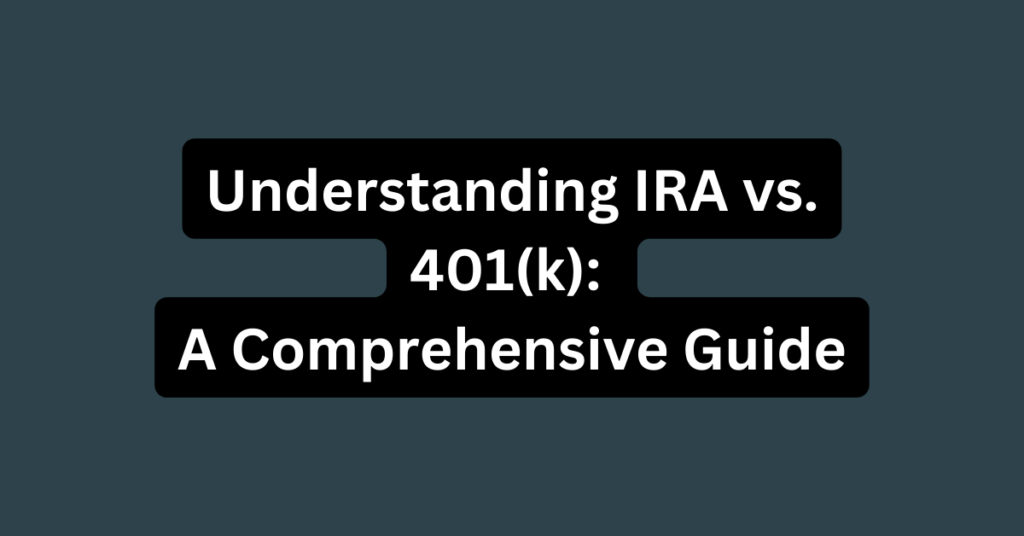Planning for retirement is a significant financial undertaking, and the choice of the right retirement account is a crucial decision. Among the various options available, the Individual Retirement Account (IRA) and the 401(k) plan stand out as popular choices, each with its set of features, benefits, and considerations. To make an informed decision about which account is the best fit for your retirement goals, it’s essential to understand the nuances of each. In this comprehensive guide, we will provide you with a detailed analysis of IRA vs. 401(k), empowering you to make the right choice for your retirement savings.

A Comprehensive Comparison
Let’s begin by exploring the fundamental aspects of both IRAs and 401(k) plans:
1. Individual Retirement Account (IRA):
Pros:
1. Flexibility:
– IRAs offer flexibility regarding contribution amounts and investment choices. You have the freedom to tailor your investment strategy to your specific financial goals.
2. Tax Benefits:
– Depending on the type of IRA (Traditional or Roth), you can enjoy either tax deductions on contributions or tax-free withdrawals in retirement.
3. No Employer Requirement:
– IRAs are not tied to your employer, making them accessible to anyone with earned income.
4. Investment Control:
– With an IRA, you have greater control over your investment choices, allowing for a more customized portfolio.
Cons:
1. Contribution Limits:
– IRAs have lower annual contribution limits compared to 401(k) plans, potentially limiting your ability to save more for retirement.
2. No Employer Match:
– Unlike 401(k) plans, IRAs do not offer employer matching contributions.
3. Investment Responsibility:
– Managing your IRA investments requires a certain level of financial knowledge and responsibility.
4. Income Restrictions:
– Roth IRAs have income limits that may prohibit high earners from contributing.
Ready to Make Informed Retirement Choices?
Explore Our Comprehensive Guide on IRA vs. 401(k). Join Our Free Retirement Planning Newsletter for Expert Advice, Bonus Podcasts, and Insights from Our Community!
2. 401(k) Retirement Plan:
*Pros:*
1. Higher Contribution Limits:
– 401(k) plans allow for significantly higher annual contributions, making them an excellent choice for individuals looking to maximize their retirement savings.
2. Employer Matching:
– Many employers offer matching contributions to 401(k) plans, providing an opportunity to grow your retirement savings more quickly.
3. Automatic Payroll Deductions:
– Contributions to a 401(k) are often made through automatic payroll deductions, fostering consistent savings habits.
4. Potential for Loans:
– Some 401(k) plans permit participants to take loans from their accounts in case of financial emergencies.
Cons:
1. Limited Investment Choices:
– 401(k) plans typically offer a limited selection of investment choices, which may restrict your ability to diversify your portfolio.
2. Employer Dependence:
– Access to a 401(k) plan is contingent on your employer’s offerings, leaving you dependent on your employer’s retirement benefits.
3. Vesting Periods:
– Some employer contributions may be subject to vesting periods, meaning you won’t fully own them until you’ve worked for the company for a specified duration.
4. Less Control:
– With a 401(k), you have less control over investment choices, as your options are usually determined by the plan sponsor.
Making an Informed Decision
The decision between an IRA and a 401(k) should align with your specific financial situation and retirement objectives. Here are some considerations to help you make the right choice:
1. Employer Offerings: If your employer provides a 401(k) with matching contributions, consider taking full advantage of this valuable benefit.
2. Tax Considerations: Assess whether the immediate tax deduction of a traditional IRA or the tax-free withdrawals of a Roth IRA align better with your financial goals and tax strategy.
3. Contribution Limits: If you wish to contribute a substantial amount to your retirement savings, a 401(k) allows for higher contributions.
4. Investment Control: If you prefer a broader range of investment options and more control over your portfolio, an IRA may be your preferred choice.
5. Diversification: Evaluate how each account fits into your overall investment portfolio and diversification strategy.
In conclusion, the decision between an IRA and a 401(k) is a pivotal aspect of retirement planning. Both accounts offer unique advantages, and you may even choose to utilize both to create a well-rounded retirement savings strategy. To make the best decision, consult with a financial advisor who can provide personalized guidance tailored to your needs.
Secure Your Financial Future Today!
Delve into the Comprehensive Guide: IRA vs. 401(k). Subscribe Today and Gain Access to Expert Insights, Bonus Podcast Episodes, and Exclusive Community Perspectives!
Disclaimer: This article provides general information about IRAs and 401(k) plans and is not intended as financial advice. Please consult a financial advisor for personalized guidance.